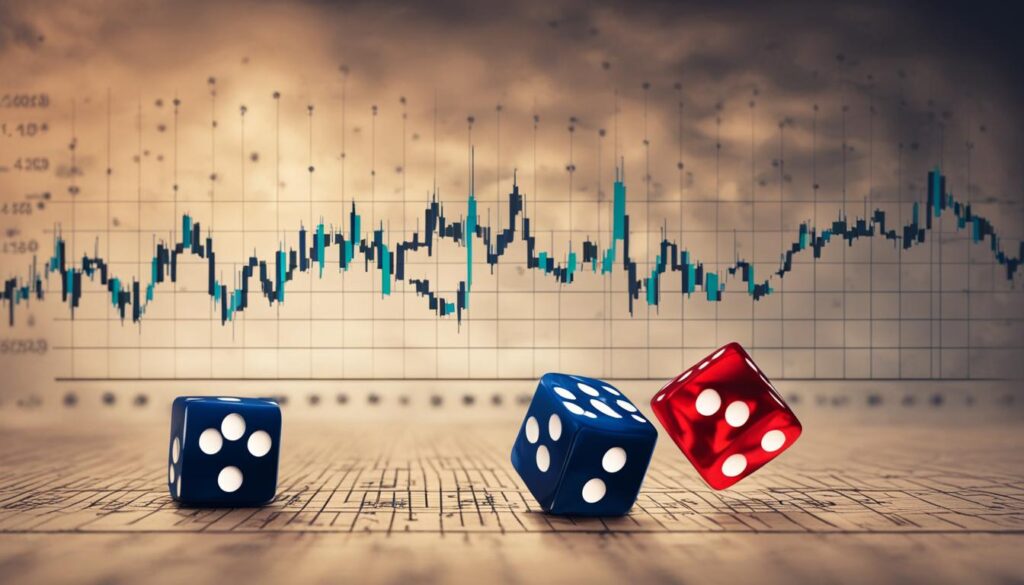When it comes to investing, there are many factors that can influence our decision-making. One of these factors is the Gambler’s Fallacy, a misconception about the probability of a particular outcome in gambling. This fallacy can have a significant impact on our investment choices and ultimately our financial success.
The Gambler’s Fallacy is the belief that past events can influence future outcomes, even in games of chance where each event is independent. This means that the probability of a particular outcome remains the same, regardless of what has happened in the past.
Understanding the Gambler’s Fallacy is crucial in making informed investment decisions. By recognizing that market patterns are not influenced by previous outcomes, we can avoid falling into the trap of making poor choices based on false beliefs.
Key Takeaways:
- The Gambler’s Fallacy is a misconception about the probability of a particular outcome in gambling.
- Each event in a game of chance is independent, and the probability of a particular outcome remains the same.
- Understanding the fallacy is crucial in making informed decisions and avoiding common pitfalls.
- Market patterns are not influenced by previous outcomes, and it is important to rely on objective analysis and logical reasoning when making investment decisions.
- Avoiding the Gambler’s Fallacy can help navigate market patterns and manage risk perception effectively.
What is the Gambler’s Fallacy?
The Gambler’s Fallacy is a belief that past events can influence future outcomes in a game of chance. From a mathematical point of view, this belief is not supported by the probability of each event being independent. Each event in a game of chance, such as a coin flip or a dice roll, has its own probability and is not affected by previous outcomes. The outcome of a coin flip, for example, is always a 50% chance for heads and 50% chance for tails, regardless of previous flips.
From a psychological perspective, the Gambler’s Fallacy can be linked to superstitions and the illusion of control over the outcome of a game. People often search for patterns or streaks in random events and believe that they have some control over the outcome. This belief can lead to irrational decision-making and poor choices based on false beliefs about probability.
“Luck is what happens when preparation meets opportunity.” – Seneca
To illustrate the Gambler’s Fallacy, let’s consider a roulette wheel. If the ball has landed on black for the past five spins, some players may believe that red is “due” to come up next and place their bets accordingly. This belief is based on the assumption that there is a balance in the universe and that the previous outcomes will influence the future ones. However, each spin is an independent event, and the probability of landing on red or black remains the same, regardless of past outcomes.
Example of the Gambler’s Fallacy:
Suppose you are flipping a fair coin. After 5 consecutive heads, you may start to believe that tails is more likely to come up next to “balance” the outcomes. However, the probability of getting heads or tails on the next flip is still 50%. The previous outcomes do not influence the future ones.
| Flip | Outcome |
|---|---|
| 1 | Heads |
| 2 | Heads |
| 3 | Heads |
| 4 | Heads |
| 5 | Heads |
As shown in the table above, the previous outcomes have no influence on the next flip. Each flip has a 50% chance of landing on heads or tails, regardless of past results.
It is important to debunk the Gambler’s Fallacy to make decisions based on understanding mathematical probability rather than superstitions or false beliefs. By recognizing the fallacy and making informed choices, individuals can avoid the potential financial losses associated with irrational decision-making.
Understanding Probability and Chance
Probability and chance are fundamental concepts in understanding the Gambler’s Fallacy and its implications for stock market investments. Probability refers to the likelihood of a particular event occurring, while chance recognizes the unpredictable nature of events subject to probability.
One common misconception related to probability and chance is the hot hand fallacy. This fallacy suggests that a successful streak will continue, leading individuals to make investment decisions based on the belief that a particular stock will continue to perform well because it has been performing well recently. However, the hot hand fallacy disregards the independent nature of each investment and the fact that past performance does not guarantee future results.
On the other hand, the gambler’s fallacy assumes that previous outcomes can influence future outcomes. For example, individuals may believe that if a stock has been consistently declining, it is bound to rebound soon. However, this assumption overlooks the fact that each investment is an independent event, and the probability of a particular outcome remains the same regardless of previous outcomes.
Table: Probability and Chance in Stock Market Investments
| Probability | Implications | |
|---|---|---|
| Hot Hand Fallacy | The belief in a continued successful streak. | May lead to biased investment decisions based on recent performance. |
| Gambler’s Fallacy | The assumption that previous outcomes influence future outcomes. | Can result in poor investment choices based on false beliefs. |
Understanding probability and chance is crucial in making informed investment decisions. It is essential to base decisions on objective analysis, independent research, and logical reasoning rather than relying on misconceptions and false beliefs. By acknowledging the independent nature of investments and the inherent unpredictability of the stock market, investors can navigate market patterns with a clearer understanding and manage risk perception more effectively.

Why We Believe in Streaks?
Believing in streaks, also known as the streaks fallacy, is influenced by various psychological factors that can cloud our judgment and decision-making. One of these factors is confirmation bias, which leads us to seek out information that aligns with our existing beliefs and ignore contradictory evidence. This bias can reinforce the belief in streaks because we tend to remember and focus on instances where a streak occurred, rather than instances where it did not.
Another psychological factor at play is the illusion of control. We often have an inflated sense of control over random events, leading us to believe that we can influence outcomes based on our actions or behaviors. This illusion fuels the belief that a streak will continue because we feel that we have some control over its outcome.
“People have a natural inclination to believe that they can influence the outcome of random events, which can lead to irrational beliefs in streaks.”
Superstitions can also contribute to the belief in streaks. We may develop rituals or engage in superstitious behavior, believing that they will bring about a desired outcome or prolong a streak. These superstitions provide a sense of comfort and control, even though they are not based on logical reasoning or evidence.
Understanding these psychological factors can help us make more rational decisions and avoid falling into the trap of the gambler’s fallacy. By recognizing the role of confirmation bias, the illusion of control, and superstitions, we can approach streaks and random events with a more objective mindset, relying on statistical probability rather than subjective beliefs.

The Influence of Confirmation Bias
Confirmation bias plays a significant role in reinforcing the belief in streaks. It is our tendency to seek out information that supports our existing beliefs and ignore information that contradicts them. When it comes to streaks, we remember and focus on instances where a streak occurred, while disregarding instances where it did not. This selective attention can create the illusion that streaks are more common or influential than they actually are.
The Illusion of Control
The illusion of control is another psychological factor that contributes to the belief in streaks. We have a natural inclination to believe that we can influence the outcome of random events, even when there is no logical or causal connection. This belief gives us a sense of control and can lead us to believe that a streak will continue based on our actions or behaviors. However, in reality, each event in a game of chance is independent, and previous outcomes have no bearing on future outcomes.
The Role of Superstitions
Superstitions can also play a role in reinforcing the belief in streaks. We may develop rituals or engage in superstitious behavior, believing that they will bring about a desired outcome or prolong a streak. These superstitions provide a sense of comfort and control, even though they are not based on logical reasoning or evidence. By relying on superstitions, we are essentially attributing the outcome of a random event to unrelated actions or behaviors, further perpetuating the belief in streaks.
| Psychological Factors | Description |
|---|---|
| Confirmation Bias | Seeking out information that confirms existing beliefs and ignoring contradictory evidence |
| Illusion of Control | Believing that we can influence the outcome of random events based on our actions or behaviors |
| Superstitions | Engaging in rituals or superstitious behavior, attributing outcomes to unrelated actions or behaviors |
Conclusion
The Gambler’s Fallacy is a cognitive bias that can have serious implications for investment decision-making. By understanding this fallacy and its impact on market patterns and risk perception, investors can navigate the financial landscape more effectively.
It is crucial to recognize that each event in the world of investing is independent and does not rely on past outcomes. Believing in the Gambler’s Fallacy can lead to poor choices based on false assumptions about probability and chance.
Investors should rely on objective analysis, independent research, and logical reasoning to make informed decisions. By avoiding the pitfalls of the Gambler’s Fallacy, individuals can better manage risk perception and maximize their investment potential.
FAQ
What is the Gambler’s Fallacy?
The Gambler’s Fallacy is a misconception about the probability of a particular outcome in gambling. It is the belief that past events can influence future outcomes, even though each event in a game of chance is independent and the probability of a particular outcome remains the same.
How does the Gambler’s Fallacy affect investment decisions?
The Gambler’s Fallacy can lead to poor choices based on false beliefs about probability and chance. Investors may make irrational decisions based on streaks or past outcomes, without considering objective analysis, independent research, and logical reasoning.
What is the difference between probability and chance?
Probability refers to the likelihood of a particular event occurring based on mathematical calculations, while chance refers to the unpredictable nature of events subject to probability.
What are some examples of misconceptions about probability and chance?
The hot hand fallacy suggests that a successful streak will continue, while the gambler’s fallacy assumes that previous outcomes can influence future outcomes. These fallacies can affect decision-making in stock market investments and lead to poor choices based on false beliefs.
Why do we believe in streaks?
Belief in streaks, also known as the streaks fallacy, is driven by psychological factors such as confirmation bias, illusion of control, and superstitions. People tend to look for information that confirms their beliefs, believe they have more control over random events than they actually do, and rely on superstitions to reinforce their belief in streaks.
How Does Probability Thinking Apply to Making Investments?
Probability thinking in personal finance is essential when it comes to making investments. By analyzing past data, individuals can calculate the likelihood of an investment yielding positive returns. This approach helps in understanding the potential risks and rewards, enabling investors to make informed decisions. Incorporating probability thinking enables a more strategic approach to financial planning and increases the chances of achieving long-term investment goals.


Pingback: The Mind’s Bet: Behavioral Economics and the Gambler’s Fallacy – Straight Fire Money